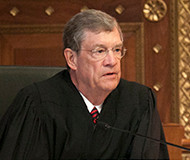Article from: www.thenewspaper.com/news/49/4996.asp
7/12/2016
Ohio Court Of Appeals Wants More Speed Cameras
A divided Ohio Court of Appeals panel overrules legislature, declaring no limits on the use of automated ticketing machines.
 A majority of judges on an Ohio Court of Appeals panel decided last week to overrule the state legislature on the issue of speed cameras and red light cameras. Judges James D. Jensen and Arlene Singer insisted that no regulation of any kind could be imposed on cities that outsource traffic tickets to private companies like American Traffic Solutions and Redflex Traffic Systems of Australia.
A majority of judges on an Ohio Court of Appeals panel decided last week to overrule the state legislature on the issue of speed cameras and red light cameras. Judges James D. Jensen and Arlene Singer insisted that no regulation of any kind could be imposed on cities that outsource traffic tickets to private companies like American Traffic Solutions and Redflex Traffic Systems of Australia.
At issue was the bill commonly, but incorrectly, referred to as a "ban" on automated ticketing machines that lawmakers passed in an effort to rein in municipal use of the controversial devices. The most hotly contested provision of the law required cities to position an actual police officer near a camera before a private vendor would be allowed to mail out a ticket. The 2 to 1 appellate decision affirmed a lower court ruling (view case) that found this requirement too burdensome on localities, citing the 2005 Canton v. Ohio state Supreme Court case that held only "general laws" passed by the General Assembly could overrule a municipal ordinance.
"In effect, the conditions established by the legislature actually render illusory most municipalities' right to use photo detection devices for enforcing traffic laws," Judge Jensen wrote for the Court of Appeals majority. "To the extent that the relevant provisions of Senate Bill 342 operate primarily to limit the legislative power of municipal corporations to set forth their own police, sanitary, or similar regulations, they fail to satisfy the third requirement of the Canton general law analysis."
The court's description is undermined by the explosion in Ohio municipalities using fully compliant hand-held speed cameras to issue just as many tickets under the new law. These jurisdictions include Girard, Liberty, Linndale, Newburgh Heights, New Miami, Parma, Weathersfield and Youngstown. In fact, Toledo began testing the devices earlier this year.
The court majority was also offended by the law's restrictions on the ability of municipalities to ticket motorists for driving less than 6 MPH over the speed limit, requiring safety studies and setting up administrative hearings with at least a minimal set of due process protections.
The majority decision, however, is already in conflict with another Court of Appeals decision (view ruling) from February, meaning the issue will ultimately be resolved by a forthcoming Ohio Supreme Court decision.
In a dissent, Judge Stephen A. Yarbrough argued that the majority completely misinterpreted the state Supreme Court's direction on the definition of a general law, citing a case where the high court rejected a municipality's challenge to statewide limits on vehicle sizes and loads.
"I disagree with the majority's premise that Senate Bill 342 does not operate uniformly throughout the state simply because it has an arguably greater impact on those municipalities with fewer traffic cameras," Judge Yarbrough wrote. "Although this may be true, the cost incurred for each camera would be consistent across municipalities since the same regulations apply statewide... The fact that Toledo's program may be more expensive than a suburban municipality's program is due to the fact that Toledo has decided to employ 44 cameras, not because Senate Bill 342 regulates Toledo's program differently than any other municipal traffic law photo monitoring program."
A copy of the ruling is available in a 1.2mb PDF file at the source link below.
Source: Toledo v. Ohio (Court of Appeal, State of Ohio, 7/8/2016)
Permanent Link for this item
Return to Front Page
 A majority of judges on an Ohio Court of Appeals panel decided last week to overrule the state legislature on the issue of speed cameras and red light cameras. Judges James D. Jensen and Arlene Singer insisted that no regulation of any kind could be imposed on cities that outsource traffic tickets to private companies like American Traffic Solutions and Redflex Traffic Systems of Australia.
A majority of judges on an Ohio Court of Appeals panel decided last week to overrule the state legislature on the issue of speed cameras and red light cameras. Judges James D. Jensen and Arlene Singer insisted that no regulation of any kind could be imposed on cities that outsource traffic tickets to private companies like American Traffic Solutions and Redflex Traffic Systems of Australia.